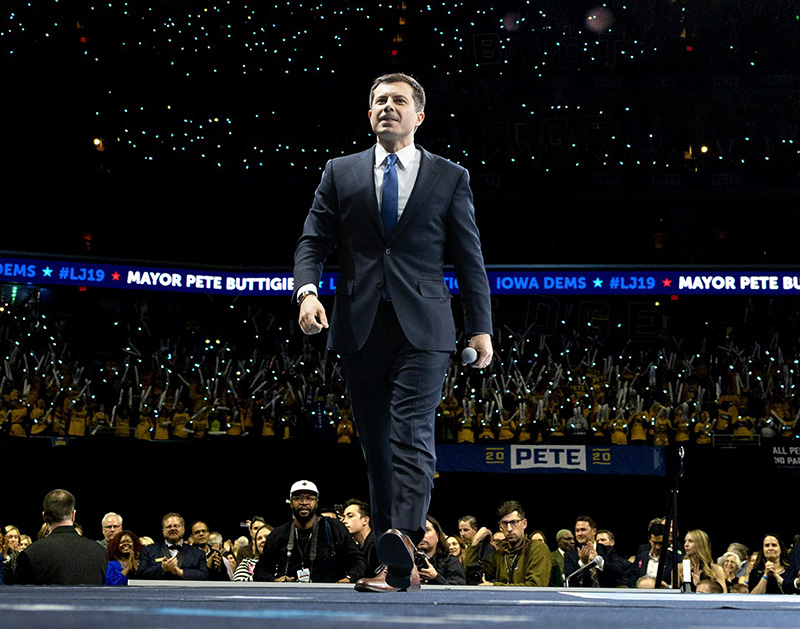Pete Buttigieg leads Iowa caucus with most delegates thus far
Buttigieg currently leads in delegate count with 75% of precincts reporting, and will likely finish in the top two

Former South Bend mayor and Democratic presidential contender Pete Buttigieg currently leads in the limited results of the Jan. 3 Iowa caucus, earning 442 state delegate equivalents with 75% of all precincts reporting. Close behind is Sen. Bernie Sanders (I-Vt.), who has 414 state delegate equivalents.
Because Iowa is a caucus, and not a primary, candidates battle in each individual precinct for a specific number of delegates based on their performance. In total, there are 2,107 SDEs that will be divided up among all candidates. The delegates chosen by the precinct then go to the county convention to choose delegates to the district and state conventions, which then award pledged delegates based on each candidate’s performance in each of Iowa’s four congressional districts, as well as statewide. Those pledged delegates are the people who will cast their vote for the eventual party nominee at the Democratic National Convention in Milwaukee in mid-July.
Iowa awards SDEs on a formula that is based, in part, on how strongly Democrats generally perform in particular precincts in general elections. But a winning candidate must also demonstrate an ability to win in multiple regions of the state to attain “viability,” or the minimum threshold for being awarded delegates. As such, even if turnout surges in urban areas or college towns, those precincts have a fixed number of delegates and supporters of a winning candidate in those areas cannot necessarily overwhelm the rest of the state as they could if a primary were held.
During the initial alignment, when voters openly state their preference for a particular candidate, Sanders led in raw vote totals due to his strong performance in several heavily-populated counties, doing extremely well among younger and more liberal caucus-goers, particularly in college towns and working-class communities in eastern Iowa.
But it was Buttigieg who performed the best in rural northern, western, and central Iowa, as well as in the Des Moines suburbs, where he ran up his largest margins of victory and wrangled a few extra SDEs to overtake Sanders. Buttigieg also benefitted in the second realignment, emerging as a “second choice” for many voters in precincts where candidates like former Vice President Joe Biden or Minnesota Sen. Amy Klobuchar were unable to reach viability.
Looking at other candidates’ performance thus far, Massachusetts Sen. Elizabeth Warren placed third with 299, or 18%, of SDEs. Biden, who currently holds 257, of 15.6% of SDEs, appears to have placed fourth. Klobuchar, who placed fifth, earned 206 SDEs and showed surprising pockets of strength in rural and generally Republican-leaning areas.
Reporting of the caucus was marred by confusion and a significant delay in reporting results. The delay was caused partially by a malfunction in an app being used to report three sets of results: the number of raw votes obtained by each candidate in each precinct on the first alignment, the number of votes obtained on the second alignment, and the number of SDEs awarded based on that performance. Additional complications, such as a lack of available people to deal with technology issues or accept vote totals, prolonged the process, leaving precinct captains on hour-long holds as they attempted to report their results by phone to their superiors.
Candidates, including those who did not do well, simply issued speeches or statements telling supporters that they were moving on to the next contest for the nomination, the New Hampshire primary.
Related: Iowa woman tries to retract vote for Pete Buttigieg after finding out he’s gay
The Iowa Democratic Party eventually released a drop of data from 62% of precincts on 5 p.m. Tuesday, but the final winner remained uncertain. Party Chair Troy Price apologized for the botched reporting results, calling the delay “unacceptable.”
Price tried to assure voters and the media that the results were accurate and reliable, noting that all precinct captains had paper records of the results and indicating that it was simply a technological error, not tabulation errors, that led the party to delay the reporting of results out of an abundance of caution. He has promised a “thorough, transparent, and independent examination” of what occurred on Jan. 3 once all results are reported, according to the Des Moines Register.
“Let me be clear: My number one priority has been on ensuring the accuracy and integrity of the results,” Price said in a news conference. “And we have been working all night to be in the best position to report results.”
Prior to any results being released, and based on limited data, Buttigieg declared victory in Iowa on Monday night, giving a triumphant speech in an attempt to undercut his rivals and establish a positive narrative that his campaign had built momentum ahead of the New Hampshire primary on Feb. 11.
“Tonight an improbable hope became an undeniable reality,” Buttigieg said. “We don’t know all the results. But we know, by the time it’s all said and done, Iowa, you have shocked the nation, because by all indications, we are going on to New Hampshire victorious.”
The LGBTQ Victory Fund released a statement celebrating Buttigieg’s performance, which will either result in a first-place finish or narrow second-place finish in terms of SDEs.
“Pete’s strong showing in Iowa represents a revolution in American politics, upending traditional notions of electability and proving America is ready to elect its first openly gay president. With defeating Donald Trump top of mind, Iowa voters determined Pete is the best candidate to do it, a powerful statement about our progress as a country as this primary season begins,” former Houston Mayor Annise Parker, the president and CEO of LGBTQ Victory Fund, said in a statement.
“The messy Iowa reporting process should not distract anyone from the historic moment that played out last night. Pete — running against 10 opponents including some of the best-known names in American politics — overcame the obstacles and the odds to land in one of the top spots, if not the top spot, in the Iowa caucuses. It is an incredible achievement for an openly gay candidate and speaks to his ability to build a broad coalition among voters in cities, suburbs and rural areas. It forever changes how the media, pundits and voters view the electability of openly LGBTQ candidates.”
Editor’s note: This story was updated to clarify how the Iowa caucus process works.
Read more:
WATCH: Starbucks airs wonderful pro-trans ad celebrating name recognition
Donald Trump allegedly called journalist with transgender parent “that b***h with the tr***y dad”
Virginia House passes bill banning conversion therapy for LGBTQ minors
Support Metro Weekly’s Journalism
These are challenging times for news organizations. And yet it’s crucial we stay active and provide vital resources and information to both our local readers and the world. So won’t you please take a moment and consider supporting Metro Weekly with a membership? For as little as $5 a month, you can help ensure Metro Weekly magazine and MetroWeekly.com remain free, viable resources as we provide the best, most diverse, culturally-resonant LGBTQ coverage in both the D.C. region and around the world. Memberships come with exclusive perks and discounts, your own personal digital delivery of each week’s magazine (and an archive), access to our Member's Lounge when it launches this fall, and exclusive members-only items like Metro Weekly Membership Mugs and Tote Bags! Check out all our membership levels here and please join us today!




























You must be logged in to post a comment.